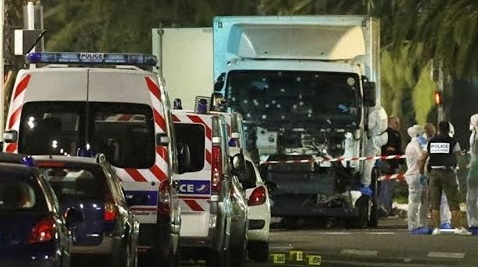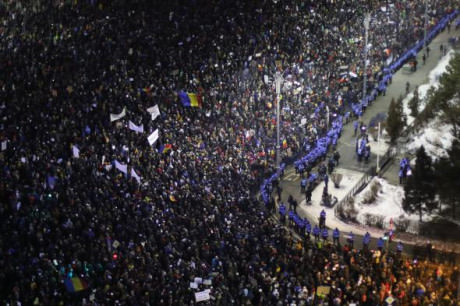By Modeste Schwartz.
Romania – Yesterday, July 4 2018, the Romanian Supreme Court – having the final word after a long series of appeals – sentenced two Szekler activists (István Beke and Zoltán Szőcs) to 5 years in prison, causing national outrage in Hungary and the Hungarian minority in Romania.
In the year of the centenary of the “Romanian reunification” (according to the Romanian version of history), or the “annexation of Transylvania” (according to the Hungarian version), this event seems almost natural: “natural” intensification of ethnic tensions, “natural” reactivation of Hungarian irredentism (especially in the Szekler enclave, where Hungarian-speakers are a clear majority), “naturally” causing a tough counter-offensive of the Romanian authorities.
And yet all this is false, tragically false. Let’s see why:
1) István Beke and Zoltán Szőcs, as members of the Sixty-four Counties Youth Movement (HVIM in Hungarian – these are the 64 counties of Greater Hungary before 1918) are certainly followers of an ideology that can be described as unconstitutional under Romanian law – but no more than that, for example, of Corsican or Basque separatists in France. However, there is one major difference with the Corsican or Basque situations: for more than 25 years, in the extremely peaceful Romania, political violence (including ethno-political violence) disappeared, and did not present any signs of come-back in recent years. István Beke and Zoltán Szőcs have always denied the terrorist intentions of which they have been suspected based on extremely dubious “evidence”, most likely made-up (and, by the way, quite poorly made up). The Romanian Supreme Court actually even recognizes this half-heartedly in its sentence, dismissing the charge that previously pointed in the direction of terrorist acts (“violation of the rules relating to explosive materials”), to retain only the – rather foggy – charge of “attempted attack on the community”, which seems to refer rather to the sentenced activists’ ideology than to any actual or potential acts. In other words, the Supreme Court implicitly recognizes that Messrs. Beke and Szőcs are now prisoners of conscience – a fact confirmed by the attitude of the Romanian security forces towards them over the last 18 months, an attitude that should at least be described as lax if we wanted to stick to the (obviously wrong) assumption that anyone in Bucharest believes in the “Szekler peril”: after 11 months of pretrial detention (from December 2015 to November 2016), the two “terrorists” were not only released for 18 months, but sources close to the accused tell us that Zoltán Szőcs was even allowed to leave the territory, going to spend summer holidays with his wife in Croatia. It is therefore quite obvious that none of the judges who signed the sentence of July 4 sincerely believes that Messrs. Beke and Szőcs would represent a social danger (and if so, one can also wonder to what extent sending such relatively young men to jail for five years – i.e.: a remaining jail period of four years and one month, after deduction of the 11 months of pretrial detention – could be enough to remove this danger …).
2) Under such circumstances, I think that it can be stated objectively that the sentence delivered on July 4 is counter-productive from the point of view of its own official motives. As HVIM is an ultra-minority structure within the Hungarian-speaking population of Romania, any policeman in the world who has had to deal with activism issues would of course choose to fight it by means of ridiculing and political isolation (relying for this on the party of the Hungarian minority, the ultra-majority and constitutionally loyal RMDSZ / UDMR, allied for over a year to Viktor Orbán’s FIDESZ, which itself has good relations with the coalition in power in Bucharest). We must therefore choose: either the Romanian judges are stupid (which seems rather unlikely to me), or the real motivations of their judgment are not those invoked in the sentence – but, on the contrary, a desire to worsen inter-ethnic tensions in Transylvania, so that said judges are probably by now guilty of the crime of high treason from the point of view of the well-understood interests of the Romanian state.
3) Generally ignorant of Romanian political realities, Hungarians (not only in Hungary, which is hardly surprising – but even in Romania!) tend to treat the Romanian state and the (ethnically) Romanian political class (i.e. all parties with the exception of the RMDSZ / UDMR) as a single block. Thus, the Hungarian-speaking pages of social networks have been filled with protests and insults against the current Romanian government. But the recent conviction – by the same Supreme Court, thirteen days earlier! – of Liviu Dragnea, head of the ruling coalition, blindingly demonstrates how far the Romanian “judicial system” (totally infiltrated by the “services” – meaning: the Romanian deep state), has not only freed itself of any governmental control, but even morphed (in a totally unconstitutional way) into an instrument of political struggle against this very government and its Hungarian allies, both internal (RMDSZ / UDMR) and external (FIDESZ).
Rather than a desire to counter a largely overplayed “Szekler peril”, the decision of the Romanian Supreme Court – which has become the instrument of a permanent judicial coup at the service of foreign interests – betrays before all the intention of driving a wedge between Bucharest and Budapest, and between the (ethnically) Romanian parties of the PSD-ALDE coalition and the RMDSZ / UDMR.
Meanwhile, within the Hungarian minority in Romania, interestingly enough, the (mostly urban / liberal / Europhile) circles which are most keen on ignoring in their recriminations the differences between the Romanian judicial system and the ruling coalition (quite hypocritical recriminations, by the way, considering the “political color” of the accused) were also those who, two weeks earlier, were most heartily celebrating the sentence against Liviu Dragnea, and most harshly criticized the RMDSZ / UDMR for having voted in favor of legislative amendments aiming at reducing arbitrariness in the Romanian judiciary system. One of the opinion leaders in these circles – former Senator Péter Eckstein-Kovács – even theatrically slammed the door of the RMDSZ / UDMR (where his career had come to an end anyway) in protest against the vote. Yet – as the RMDSZ / UDMR has meanwhile recalled on its official Facebook page – this vote only supported those proposed changes that finally align the Romanian judicial practice on … the recommendations of the European Court of Human Rights! One may wonder how Eckstein, himself a brilliant lawyer, managed to ignore for so long the totalitarian aspects of his country’s law – perhaps under the effect of overwork, after having been named in 2009 an adviser to President Traian Băsescu, “in replacement” for the senatorial mandate he had just lost in the 2008 elections. In any case, we are still waiting for the frenetic applause with which he should, in good logic, welcome the imprisonment of the two Szekler activists.
Despite the undeniable sincerity (not to say naïveté) of many of these outraged reactions, we must face the obvious: the Hungarian liberals who contest the strategic positioning of the RMDSZ / UDMR are by now objective allies of this Romanian deep state that they think (or pretend) to fight when it happens to abusively jail Szekler activists. As ideological vector of this strange complicity, the adoration of the West has long ensured a convergence of those who denounce “corruption” (i.e.: indigenous capitalism) and those who denounce “nationalism” (i.e.: Great Romanian chauvinism). The trouble is that this Westernist snake is now biting its tail, since (mostly because of Viktor Orbán’s rise), on the Romanian side, the crusaders against “corruption” have meanwhile also become the fiercest promoters of “chauvinism”.
This all-out activation of the agents of the Romanian deep state (within the Romanian judicial system, but also within the Hungarian-speaking “civil society”) on the occasion of the Year of the Centenary was predictable, and, as we pointed out almost a year ago (here and here), the two strongmen of Budapest and Bucharest have been fully aware of this for months and have publicly stated their intention to counter any provocations intended to sow hatred between them. As for the implementation of these laudable intentions, it unfortunately shows the width of the gap between the two capitals today in terms of seriousness and efficiency. Always firm, but always polite, Viktor Orbán showed that he had nerves of steel, dodging one provocation after another (for example, the one staged by the same Romanian judicial system, in the case of the Catholic high school of Marosvásárhely / Târgu-Mureş), without ever breaking the thread of diplomacy. Meanwhile, Liviu Dragnea, too busy holding the reins of the PSD (in which far too many representatives are still far too sensitive to the charms of the deep state), has continued to sink into a policy of half-measures, flip-flopping and delays, sufficient to enrage the deep state, but unable to disarm it; he has thus achieved the negative feat of creating an enemy at once dangerous and desperate, who no longer recoils from any means of action, not even those who endanger civil peace, and therefore the most immediate national interest.
As Liviu Dragnea has just folded under the pressure of the liberal-libertarian wing of his party (a party, however, mostly acquired to the cause of the “traditional” family) by renouncing his project of a mega-demonstration in favor of a referendum on family values (revamped at the last minute in a less ideological “march against judicial abuses“), one cannot but fear that – watched on his right by the double-faced Victor Ponta, sometimes “national-liberal”, sometimes “a Romanian (wannabee) Macron” – he might end up also giving in to the “patriotic” blackmail of the deep state by sacrificing his Hungarian alliance. In which case he will also ipso facto renounce his presidential ambitions for next year, and probably any political future.
Let us add, however, to the discharge of poor Dragnea, that the current frenzy of the Romanian deep state probably does not have only internal causes. Three days before the sentence here commented, on July 1, the pseudo-expert Dan Dungaciu, chief propagandist of the “Euro-Atlantic” circles of the Romanian press, published, under the sexy (albeit somewhat absurd) headline “A Second Trianon“, a web of lies intended to make believe that Romania – an extractive colony looted for nearly thirty years by Western multinationals – would be above all the victim of… Hungarian economic imperialism. Under this delusional discourse, however, one can quite easily discern the true cause of the epileptic seizure that seems to have struck some of Mr. Dungaciu’s richest Western friends: the subtitle of Dan Dungaciu’s “analysis” happens to mention the issue of the Black Sea gas fields – to which I shall return in a future article.




